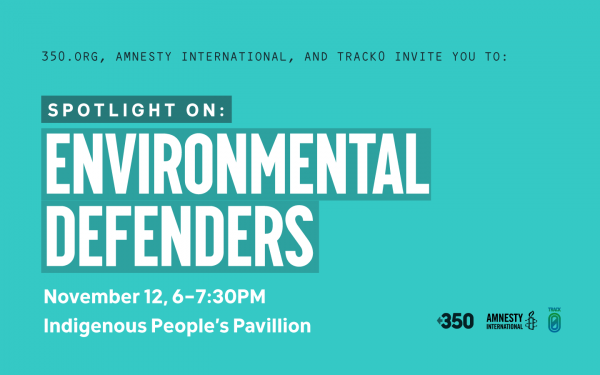More than three environmental defenders a week were killed in 2015 and hundreds face intimidation, arrest and death threats. These defenders fight to protect land, oceans, rivers & forests from destruction. Many are in the fight to keep fossil fuels in the ground — the only way to limit warming to 1.5° — and they need the legal recognition, security and protection of the state.
That’s the message we’ll be bringing to COP22 this Saturday in Marrakesh, Morocco, where the United Nations climate talks are being held. We’re partnering with Amnesty International and Track0 in bringing a spotlight on the increasing risks facing environmental defenders as they defend land, waterways and forests from extractive industries.

Keeping fossil fuels in the ground to limit warming to 1.5° will require escalating efforts by a global movement in coming months and years. As such, “Environmental Defenders” are a critical actor in achieving the Paris agreement, and more broadly, in meeting the Sustainable Development Goals. States need to recognise the important, and incredibly high risk work that environmental defenders do, by offering recognition and legal protection to them.
We’ll be live updating from the event here.
Speakers:
Victoria Tauli-Corpuz is the UN Special Rapporteur on the Rights of Indigenous Peoples. She is a human rights expert, focusing mainly on indigenous peoples’ rights and women’s rights as well as the right to development and a safe and sustainable environment. As a community organizer and an institution and movement builder, she helped establish and strengthen local indigenous peoples’ organizations as well as regional and global indigenous formations.
Roberto Marques is a chief from the ethnic group Anace. He is very active in the fight against coal power plants and fracking in the northeast of Brazil
Hindou Oumarou Ibrahim is from Mbororo pastoralist community of Chad. She is the coordinator of the Association for Indigenous Women and Peoples of Chad (AFPAT) a community based organization. She is co-chair of the International Indigenous Peoples Forum on Climate Change, the indigenous peoples’ caucus to the UNFCCC.
Mohamed Ed-Daoudy born in Imider in Morocco, Mohamed is a member of the communication & media committee of the “movement on the road ’96 ” which is a social movement in Imider. For five years, protesters have been holding a sit-in on Mount Alebban in the Atlas Mountains to protest against a silver mine nearby in Imider. The sit-in began in August 2011 with local youth demanding employment in the mine. The demands then expanded to include environmental concerns, including the use of local water sources by the mine to the detriment of the household and agricultural needs of villagers in the area, as well as pollution through toxic waste from the mine. Since then, several silver mine protesters have been arrested, prosecuted and convicted on what appear to be trumped-up criminal charges.
Winona Jalisa Kisino is a youth delegate with the Republic of the Marshall Islands. She has been an Earth Champion with an organization named “Jo-Jikum”, based in Majuro, Marshall Islands, that is responding to the climate change crisis facing the Marshall Islands as low-lying atolls. She is a Mother of two girls under the age of 5 years old.
Facilitator – Savio Carvalho, Senior Advisor, Campaigning on International Development and Human Rights, Amnesty International, International Secretariat. He has worked over two decades on international development, humanitarian and human rights in South and Central Asia, East Africa and Europe. His current focus is on establishing stronger linkages between development and human rights. He leads Amnesty International’s work on the 2030 Agenda.